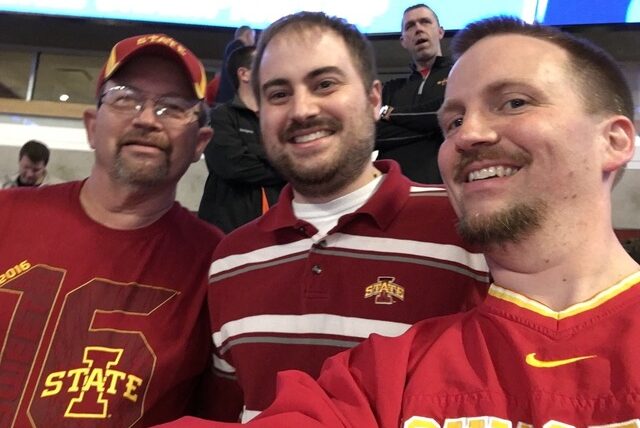Professor Aaron Striegel, Graduate Student by Accident
March 7, 2022Growing up in a small town in Iowa with a population of 300 with just over ten elementary school kids per class, six streets, and no stoplights, Professor Striegel never imagined he would become a professor of computer engineering at the University of Notre Dame. But in second grade, when giving his first “lecture” on astronomy, his parents knew being a professor was in his future. His father was interested in technology and always had the newest Apple Computer on the market, but he needed programming books to teach him how to use it. Young Striegel picked up those books and learned BASIC and LOGO programming. His parents cultivated his love of programming by enrolling him in summer camps, eventually leading him to engineering. He envisioned studying aerospace engineering at the University of Michigan. However, his uncle believed computer engineering was the next big wave and steered him toward attending Iowa State.

At the end of his senior year at Iowa State, the dot-com era was raging, and job opportunities were endless. Of course, graduate school was an option, but with the job market as hot as it was, he planned on joining his classmates on a career in industry. While attending a Distinguished Senior Banquet, the chairman nudged him to attend graduate school and offered him a graduate school fellowship. Through a lot of hard work and motivation from his advisor, research was incredibly rewarding for Professor Striegel as he relates: “My advisor, Manimaran Govindarasu, challenged me more than anyone else.” In the end, research topics that were less interesting during his undergraduate time became the central focus of his research both as a graduate and continuing to today.
Towards the end of graduate school, he spent a semester in northwest France as a graduate researcher, then a summer at Sun Microsystems. These experiences led him to apply for numerous positions in academia and industry. Fortunately, he was offered a faculty position with Notre Dame. Even though growing up Catholic in the Midwest, his only exposure to Notre Dame was the football team. He embarrassingly acknowledged he did not know where Notre Dame was before applying.
Nevertheless, he accepted the Computer Science and Engineering Department’s offer, starting as an Assistant Professor in January 2003. “Being a professor is pretty great. The ability to dive into topics, decide on your research plan is both terrifying and awesome at the same time,” says Striegel about his 19 years at Notre Dame.

His current research interest is in networking, particularly wireless networking performance and the Internet of Things (IoT). With wireless, he is interested in improving Quality of Experience (QoE) and solving network performance, responsiveness, and lag problems. Several of his research questions include: how does the network scale in the face of ultra-dense usage, how can we measure and improve performance, how can the networks be optimized whether it is moving rich, short video content like TikTok or maintaining seamless connectivity for all of the interesting new applications and uses of wireless, how do we handle the security and privacy of such optimizations?
His research in IoT grew from an interest in using wearables to understand the human condition. He has conducted world-class research using Bluetooth in face-to-face proximity to understand social ties in tandem with his collaborators, namely how one makes and keeps friends. Early studies focused on the likelihood of texting or communicating with a person after seeing them face to face. In contrast, newer studies have brought wearables, social media, and Bluetooth beacons into the mix. For example, he and his group are currently questioning what makes the team successful in job performance. They are exploring whether wearables and other technologies can provide new insight into a team’s performance.

